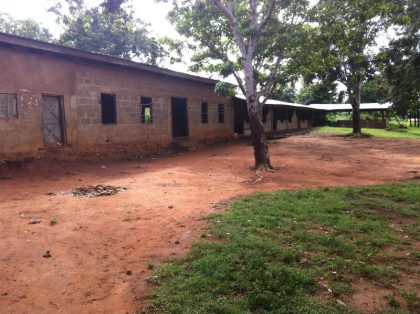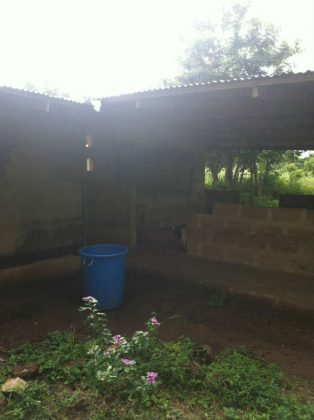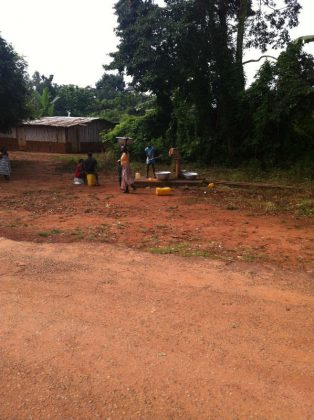 Location
Location
Bormase, Upper Manya District, Eastern Region, Ghana
Community Description
Bormase is a small community of farmers and bead makers. There is no electricity or running water.
There are only about 5 people living in the community who have completed secondary the school. About 50 percent of the men and 90 percent of the women do not speak any English.
The road was paved in 1972 and since then has not had any substantial maintenance work done on it. It is very deteriorated, and thus extension officers, nurses, and other outside resources, are reluctant to come. It can take 3 hours or more to wait for a car to fill to come to the community.
The farmers grow mostly maize and cassava, with some yam, coco and plantains to supplement their diet. Cassava and maize are the two cash crops. The cassava is processed into gari, which is a fried cassava powder, a cheap staple food all over Ghana.
Bormase Basic School serves three communities, with a total population of under 400 residents. The large majority of school-going children, up to form six, attend the school. The population is typically around 150 students, with children ranging from five years to fifteen. The school is one of the pilot programs for the Ghana School Feeding Program.
 Problem Addressed
Problem Addressed
The only source of potable water is a borehole a quarter of a mile down the main road. This causes considerable traffic at the borehole.
Currently, students go to the borehole in the morning, meaning their classes are typically delayed up to an hour. Also, they do not wash their hands before meals and are reluctant to use their drinking water for this purpose.
Project Description
This project is to install a rainwater catchment system and 3 handwashing stations at the school.
The system will consist of a polytank, a gutter system, a block platform for the tank, and three buckets with spouts for use by the students. The tank will be used to keep the barrels filled and the garden watered.
A polytank is a large water tank made out of a very durable plastic that is very commonly used in Ghana. A 2,500-liter tank will be purchased in the regional capital, Koforidua, an hour and a half from Bormase, and transported by hired truck. The polytank has a faucet at the base to draw off water.
The stand will be built of cement blocks and earth. It will be circular about the size of the polytank itself. Inside the wall of cement blocks will be filled in with earth and then leveled off to support the tank. The stand will be about 2-3 feet, with enough space below the faucet on the take to allow for a small bucket. Cement will be used for a runoff area underneath the faucet.
The tank will be in front of the school, just under the point where two perpendicular roofs converge. The water will be used for drinking by the children and to water the garden. The garden will grow tomatoes, okra, peppers, carrots, and other vegetables that aren’t normally grown in the area. This is part of an effort to educate children about farming possibilities.
 The gutters will be attached by hangers attached to the roof, meeting at the convergence of the roofs so that water will drain directly into the polytank.
The gutters will be attached by hangers attached to the roof, meeting at the convergence of the roofs so that water will drain directly into the polytank.
Each handwashing bucket consists of a 50-liter bucket with a spout attached to the bottom. Three buckets will be purchased from Koforidua. Two will be placed near the area where the children are fed and the other will be placed just outside the latrine.
The older children will fill the handwashing buckets daily. The teachers will ultimately be responsible for the buckets, and will ensure they are locked inside the school office at the end of each day.
Water Charity funds will be used to purchase the polytank, cement, gutters, hangers, and 3 handwashing buckets, and for transport of the materials.
Labor to build the base and install the tank and gutters will be donated by the community. The water, health, and sanitation officer for the area will oversee the installation.
The community will maintain a supply of soap, and has already donated enough soap to last for a few months.
Water barrels will be purchased with community-donated funds and placed in the garden.
Project Impact
150 students will benefit from the project.
Peace Corps Volunteer Directing Project
Joseph Stein
Comments
This is an important infrastructure project for the school. It will decrease the amount of time and effort needed to retrieve potable water, and provide sufficient water to maintain the garden.
Dollar Amount of Project
$555
Donations Collected to Date
$555
Dollar Amount Needed
$0 – This project has been fully funded.
This project has been finished. To read about the conclusion of the project, CLICK HERE.